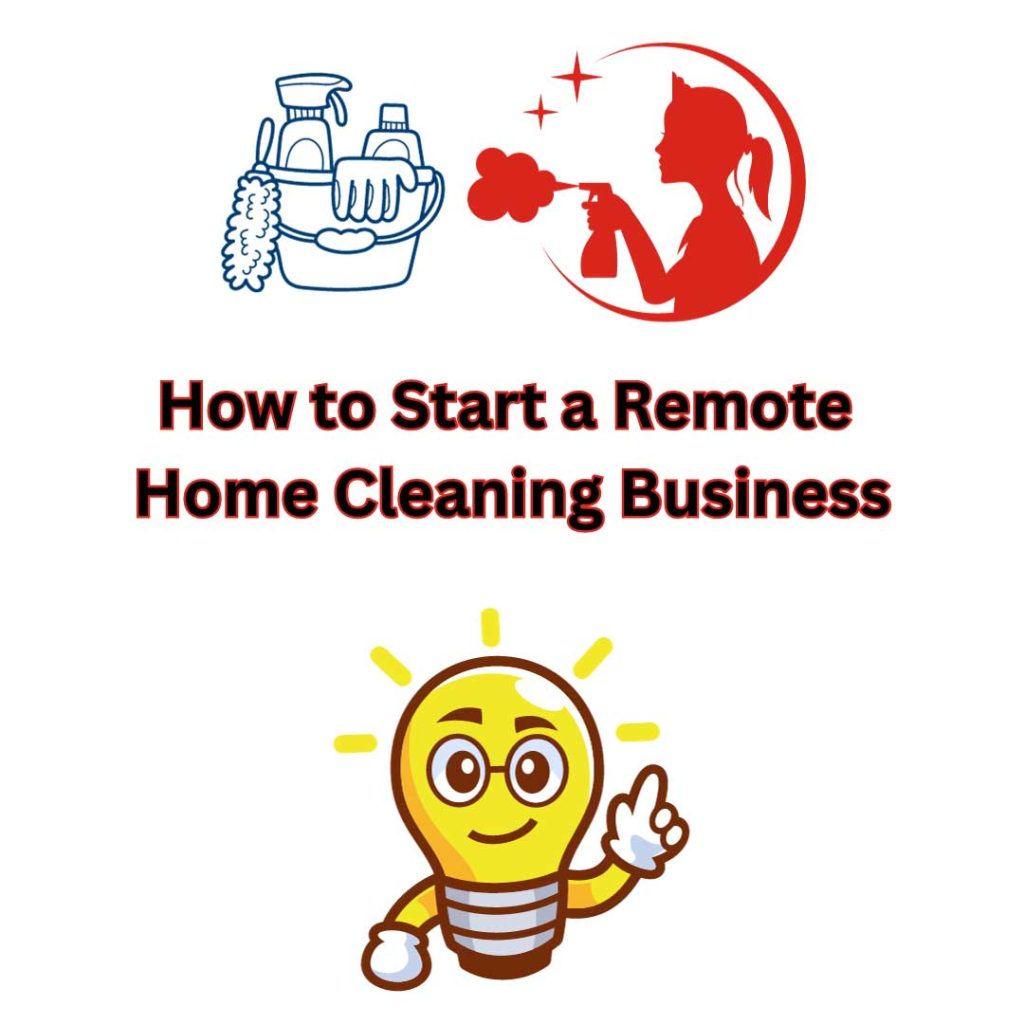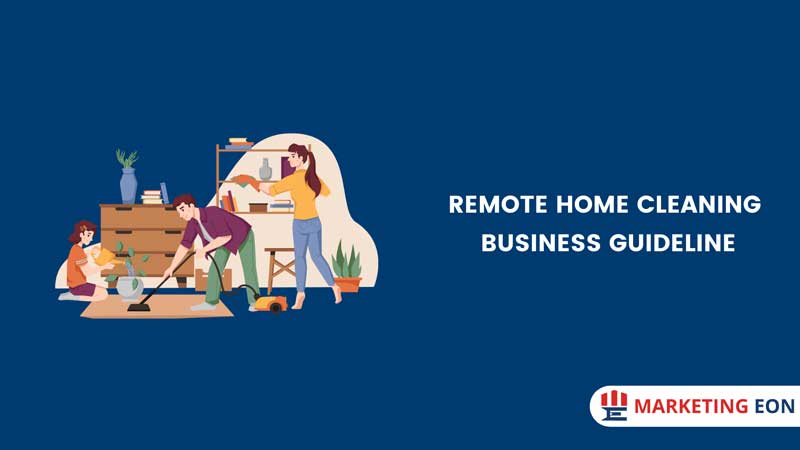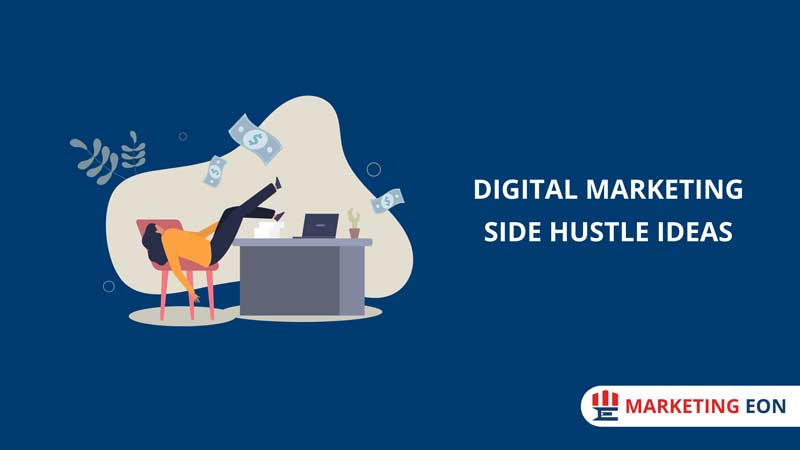Have you ever thought of starting a remote home cleaning business?
Many people have already started and are doing fantastic.
In recent years, the remote home cleaning business has emerged as a promising and innovative industry. With technological advancements, changing lifestyles, and the growing demand for convenience, remote home cleaning services have become increasingly popular. This article provides a comprehensive guide to aspiring entrepreneurs interested in starting and succeeding in the remote home cleaning business.
Understanding the Remote Home Cleaning Industry
The remote home cleaning industry has witnessed remarkable growth due to several factors. Modern consumers, with increasingly busy lifestyles, seek convenience and efficiency. They appreciate the idea of having their homes cleaned without being physically present. After the pandemic, this trend has been accelerated as people are more aware of the importance of cleanliness and hygiene.
Market Trends and Opportunities of Remote Home Cleaning Business
Market research is crucial when entering the remote home cleaning business. Identify your target market, understand their preferences, and recognize regional trends. Monitor market dynamics, including competitors and emerging niches like eco-friendly cleaning or specialized services.
Benefits of a Remote Home Cleaning Business
Running a remote home cleaning business offers numerous advantages. These include reduced overhead costs, the ability to tap into a wider customer base, and the flexibility to scale your operations quickly. Remote cleaning also contributes to reduced carbon footprint.
How to Start a Remote Home Cleaning Business
1. Conducting Market Research
Start by identifying your target audience, their demographics, and cleaning preferences. Understand the local competition and pricing in your area. Market research will help you tailor your services to meet specific customer needs.
2. Legal Requirements and Business Registration
Just like any other business, starting a remote home cleaning business also needs to comply with all legal requirements. This includes registering your business, obtaining the necessary permits, and setting up appropriate insurance coverage.
3. Creating a Business Plan
A well-structured business plan is essential for mapping out your business’s goals, strategies, and financial projections. It will also be crucial if you seek financing or investors.
4. Funding Your Business
Consider your startup costs, including equipment, software, marketing, and personnel. Explore funding options such as personal savings, loans, or seeking investors.
5. Building Your Team
- a. Hiring Remote Cleaners: Recruit skilled and trustworthy cleaners who can work remotely. It is a must to conduct a thorough background check for each cleaner. Try to take in-depth interviews to ensure the quality of your team.
- Training and Development: Invest in training programs to equip your remote cleaners with the necessary skills and knowledge. You must ensure your team members are updated on the latest cleaning techniques and safety protocols.
- Ensuring Quality Service: Implement quality control measures to maintain consistent service quality. Use checklists and regular evaluations to monitor and improve performance.
- Remote Management Tools: Utilize technology to manage your remote team effectively. Project management software, communication tools, and scheduling apps can streamline operations.

6. Technology and Tools
- Essential Software and Apps: Invest in cleaning management software that helps schedule, track tasks, and manage customer data. Consider using cloud-based solutions for accessibility.
- Inventory and Equipment: You must monitor your equipment regularly and ensure proper inventory. Regularly updating and replacing items based on needs will help you maintain quality service.
- Safety Measures: Prioritize safety by providing your cleaners with appropriate personal protective equipment (PPE) and ensuring they follow safety guidelines.
- Customer Communication: Use email, chat, and video calls to communicate clearly and promptly. Keep them informed about appointments, cleaning progress, and any service changes.
7. Marketing and Branding
- Establishing Your Brand: There is no wonder that every business needs to build its own brand image. When you can develop a strong brand identity to your target customers’ mind, you will be able to get more recurring customers. Happy customers also spread more good words regarding your service that will increase your sales.
- Online Presence: Create a fully functioning and user-friendly website for your business where customers get all necessary information easily and quickly. Optimize it for search engines to improve online visibility. Make sure your site is displaying perfectly on all devices your customers use.
- Social Media Marketing: Keep your customers updated with new information and try to make them engage with your brand on social media. You may share cleaning tips or related DIY ideas. You can also run targeted advertising campaigns to reach potential customers.
- Customer Acquisition Strategies: Implement marketing strategies such as referral programs, loyalty discounts, and partnerships with local businesses to attract and retain customers.
8. Pricing Strategies and Revenue Streams
- Pricing Your Services: Pricing is a crucial part of marketing activities that you need to play right. Do not just follow your competitors and set the price accordingly. You can get a competitive advantage if you can play with price creatively.
- Subscription Models: Subscription-based models can provide a steady stream of income. Offer recurring cleaning plans that incentivize customers to commit to regular services.
- Additional Revenue Streams: Explore opportunities to generate additional income, such as selling cleaning products, offering add-on services, or partnering with complementary businesses.
9. Managing Finances and Operations
- Budgeting and Financial Planning: Maintain a detailed budget that covers all expenses and income projections. Keep an eye on your financial statements and make adjustments as needed. Do not get too comfortable with the financing if your business runs smoothly.
- Managing Operations Remotely: Utilize management software to oversee scheduling, monitor cleaner performance, and track customer interactions. Continuously optimize your processes for efficiency.
- Customer Feedback and Improvement: The more you know about customers the better you can plan for your business. Their feedback is valuable and can be used to improve your business plan. Address concerns promptly and strive for continuous service enhancement.
10. Ensuring Customer Satisfaction
- Quality Control: Doing great in the market and sustaining for a long time, you need to maintain your service quality. There is no exception to it. Try to meet and exceed the customers’ expectations so that they can create a positive buzz in the market.
- Handling Customer Complaints: It is a must to address all complaints and try to solve the problem by adjusting things properly. You need to ensure your customers are satisfied with your services whlie making enough profit from the remote home cleaning business.
- Building Long-Term Relationships: Nurture long-term relationships with your customers through personalized communication, loyalty programs, and special offers for returning clients.
11. Scaling Your Business
- Expanding Your Service Area: Consider expanding your service area to reach a larger customer base. Research new markets and assess the feasibility of expansion.
- Franchising Opportunities: If your business model is successful, explore franchising as a way to grow your brand and revenue while allowing others to replicate your success.
- Diversifying Your Services: Explore opportunities to diversify your services, such as offering commercial cleaning, organizing services, or eco-friendly cleaning options.
12. Challenges and Future Outlook
- Challenges Faced by Remote Cleaning Businesses: Be prepared to address challenges such as competition, quality control, and managing remote teams.
- Adaptation to Technological Advances: Continuously embrace technological advancements like automation and AI to streamline operations and enhance customer experiences.
- Future Trends and Innovations: Stay informed about industry trends, including sustainability, smart home integration, and emerging cleaning technologies, to stay ahead of the curve.
Conclusion
The remote home cleaning business offers a unique blend of convenience, technology, and entrepreneurship. You can build a successful and sustainable remote cleaning business by understanding the industry, investing in the right tools, and providing exceptional service. Stay adaptable, prioritize customer satisfaction, and monitor emerging trends to ensure long-term success in this dynamic industry.
You may also read: 20 Boring Business Ideas That Can Make You Rich






